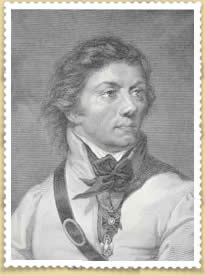A Hero of Two Continents

photo courtesy of
http://en.wikipedia.org/wiki/File:
Thaddeus_Kosciuszko.jpg
public domain image
Tadeusz (Thaddeus) Andrzej Bonawentura Kosciuszko was born in 1746, in an area of eastern Poland that is now part of Belarus. His family belonged to the landed gentry, though they were of comparatively modest means. Tadeusz attended military school in Warsaw, and then went on to study military engineering in Paris, where he also became imbued with Enlightenment ideals of freedom and equality. When the American Revolution broke out, Kosciuszko crossed the ocean to volunteer his services. He was commissioned a colonel of engineers in the Continental Army, and designed fortifications along the Delaware River, at Fort Ticonderoga, and at Saratoga, where the rebels achieved their first important victory. Afterwards, Kosciuszko fortified West Point, which later became the U.S. Military Academy, and then served with General Nathanael Greene in the South. After the war’s end, a grateful Congress granted American citizenship to Kosciuszko and made him a brigadier general. Congress also awarded him $15,000 and 500 acres of land in Ohio.
In 1784, Kosciuszko returned to Poland and retired to his family estate. Poland’s army was in disarray, and her imperial neighbors, Russia, Prussia and Austria, had already conspired to usurp large portions of Polish territory. In 1789, Kosciuszko helped to re-organize the Polish army, and in 1792, he took part in a war against Russia. In 1794, Kosciuszko led a popular uprising against invading Russian forces intent on subjugating what remained of Poland. He rallied the peasants and fought several victorious battles. At the Battle of Raclawice, Polish soldiers and peasants armed with scythes vanquished superior Russian forces. Hopelessly outnumbered, however, Kosciuszko’s army was defeated in October of 1794 at Maciejowice. Kosciuszko was gravely wounded and taken prisoner. After languishing for two years in a Russian prison, Kosciuszko was released by Emperor Paul I, following the death of Empress Catherine the Great.
In 1797, still suffering from his unhealed wounds, Kosciuszko returned to America, where he was given a hero’s welcome. After staying briefly in Philadelphia, he visited old acquaintances in other parts of the country and then rented lodgings in Philadelphia. The eminent physician, Benjamin Rush, treated his wounds, and many friends and admirers came to see him. Thomas Jefferson was a frequent visitor. Before leaving America for the last time, Kosciuszko drafted a will directing his friend, Jefferson, to use all of his American property to purchase freedom for African slaves. He then went back to Europe, where he spent the remaining twenty years of his life, first in France and then in Switzerland, never losing sight of his dream of restoring a free and independent Poland.
Champion of Human Rights
Kosciuszko was a product of the Enlightenment and dedicated his life to fighting for the rights of oppressed people everywhere. This included American colonists, Polish peasants, Jews, African slaves, and North American Indians. As Supreme Commander of the 1794 insurrection against Russian occupation, Kosciuszko initiated reforms to secure greater rights for peasants and Jews. He gained the loyalty of Polish peasants, and also formed a Jewish military brigade, which took part in the uprising.
Following his release from prison after the failed insurrection, Kosciuszko returned to America, where he expressed outrage at the plight of North American Indians. The Miami chief, Little Turtle, traveled to Philadelphia and presented Kosciuszko with a tomahawk as a sign of respect. In return, Kosciuszko gave him gifts that included a pair of pistols, and instructed the chief to use the weapons against “the first man who ever comes to subjugate you!”
Like many other enlightened men of his age, Kosciuszko was deeply troubled by the American institution of slavery. The will he drew up with Thomas Jefferson’s assistance not only charged Jefferson with purchasing freedom for Jefferson’s own or other slaves, but also stipulated that funds should be provided for their education, so they would be able to live successfully as free people. For reasons that remain obscure, Thomas Jefferson failed to carry out the terms of Kosciuszko’s American will. In another will, Kosciuszko freed the serfs on his family estate in Poland. Upon learning of Kosciuszko’s death, Thomas Jefferson remarked that he was, “as pure a son of liberty as I have ever known.”